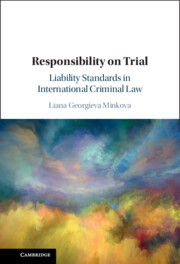Book contents
- Responsibility on Trial
- Responsibility on Trial
- Copyright page
- Dedication
- Contents
- Acknowledgements
- Abbreviations
- 1 Introduction
- 2 The International Legal Field
- 3 The International Criminal Justice Field from Within
- 4 Before Rome
- 5 Drafting the Rome Statute
- 6 Interpreting the Rome Statute
- 7 An Overview of ICC Cases
- 8 The Road to Acquittals
- 9 The Road to Convictions
- 10 Concluding Remarks
- Bibliography
- Index
9 - The Road to Convictions
Ntaganda and Ongwen
Published online by Cambridge University Press: 09 February 2023
- Responsibility on Trial
- Responsibility on Trial
- Copyright page
- Dedication
- Contents
- Acknowledgements
- Abbreviations
- 1 Introduction
- 2 The International Legal Field
- 3 The International Criminal Justice Field from Within
- 4 Before Rome
- 5 Drafting the Rome Statute
- 6 Interpreting the Rome Statute
- 7 An Overview of ICC Cases
- 8 The Road to Acquittals
- 9 The Road to Convictions
- 10 Concluding Remarks
- Bibliography
- Index
Summary
Chapter 9 explores the legal and political dilemmas arising from the assessment of individual criminal responsibility in two ICC cases, which ended in convictions: Ntaganda and Ongwen. This chapter observes that in those two cases the ICC judges have followed the same line of legal reasoning, premised on a restrained application of the modes of liability, as in the Bemba and Gbagbo and Blé Goudé cases discussed in Chapter 8. However, unlike the Bemba and Gbagbo and Blé Goudé cases, which ended in acquittal, the persons standing trial in Ntaganda and Ongwen had been actively involved in the hostilities, which have resulted in the commission of numerous crimes. The accused’s proximity to the crimes and their willingness to engage in criminal conducts convinced the judges in their criminal responsibility for the crimes, which they had committed personally, as well as the crimes, which they had committed ‘indirectly’, through their troops. Apart from two appeals judges, who expressed some concern with the reliance on the ‘control over the crime’ theory in Ntaganda, the meticulous assessment of the facts in the judgments left little room for contestation of the trial outcomes within the ICL field.
Keywords
- Type
- Chapter
- Information
- Responsibility on TrialLiability Standards in International Criminal Law, pp. 258 - 290Publisher: Cambridge University PressPrint publication year: 2023



